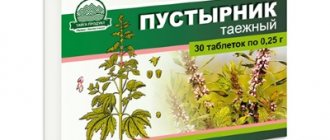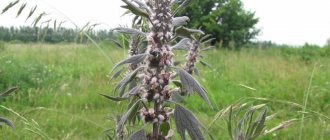Many of us know this plant as the “noxious weed,” dog nettle. And herbalists and therapists call it motherwort and consider it the best medicinal plant for women's health, cardiac and nervous systems. By the way, the ancient Greeks knew about the healing properties of dog nettle, they respected this plant in Rus', and Tibetan monks used it for treatment two thousand years ago.
What does motherwort look like?
Motherwort is a perennial erect plant from the same family as mint (Lamiaceae), although it does not at all resemble its fragrant relative in taste or smell. On the contrary, it is very bitter, and its smell is not the most pleasant. In favorable conditions, an adult plant can form into a tall (almost 2 meters), branched herbaceous bush with hollow stems. For some people, contact with the dark green “hairy” leaves of motherwort results in itching and allergies.
Content:
- What does motherwort look like?
- How is it useful for humans?
- Daily norm and dosage
- Contraindications
- How to prepare
- Motherwort medicine at home
- Use in the food industry
- Benefits in cosmetology
At the end of June, small flowers of pink, purple or white appear on the bushes. The flowering period of motherwort continues throughout the summer. As a rule, thickets of this grass are found in damp places, near landfills, on crushed stone and limestone soil. This picky plant can appear in both sunny and shaded areas of wastelands - hence its name. But the Latin name of this plant is translated as “lion’s tail”, since during the flowering period it resembles the brush of a lion’s tail.
Composition of the drug Motherwort
The most important active ingredient is motherwort extract. The plant has the ability to have an effect on the central nervous system. Flavonoid glycosides found in flowers and stems, as well as alkaloids, saponins and tannins, regulate the state of the nervous system, inhibiting its excitability. In addition, the natural components of the herb can regulate heart rate.
In addition to motherwort extracts, Motherwort forte contains magnesium. This element is indispensable in the formation of nerve connections and impulse transmission. Magnesium is found in all organs and tissues; its deficiency leads to behavioral disorders, decreased resistance to stress, and vulnerability to negative factors. In addition, a lack of magnesium can cause joint pain and night cramps.
Vitamin B6 is another important component of the drug. Without it, magnesium cannot be fully absorbed by the body. This vitamin helps you control your emotions and find the strength not to react sharply to negative information.
How is it useful for humans?
From a chemical point of view, motherwort is a combination of essential oils, alkaloids, glycosides, iridoids, flavonoids, terpenoids, caffeic, citric and malic acids, tannins, choline and vitamin A.
Research conducted by the Chinese indicated that the beneficial chemicals usually contained in motherwort reach their maximum concentration during the flowering period of the grass. By the way, in ancient China it enjoyed the fame of a long-living plant. In Greece, motherwort infusions were given to pregnant women to ease the process of childbirth and calm nerves after the birth of the baby. By the way, the Hellenes called this plant “mother’s grass.” In addition, the ancient Greeks used motherwort to strengthen the heart. And in medieval Europe this herb was known as a medicine for cattle.
Today this medicinal herb is known as:
- heart tonic;
- diuretic;
- antirheumatic;
- antispasmodic;
- astringent;
- carminative;
- stimulating menstruation;
- sedative.
Motherwort is considered useful for treating mild forms of Graves' disease. It has antioxidant and immunostimulating properties and has a positive effect on the central nervous system. It is known that the juice of this herb accelerates the removal of toxins from the body, and also improves the functioning of the kidneys, liver, gall and bladder.
But motherwort is best known as a heart herb (the name of one of the varieties of this plant is motherwort). Its extract is useful in the treatment of chronic cardiovascular diseases in the elderly. Some varieties of dog nettle have sedative effects, reducing muscle spasms and lowering blood pressure. Studies have shown that the herb extract slows blood clotting, prevents thrombosis, reduces the amount of fat in the blood, and also calms an overly fast heartbeat.
Herbalists use this plant to treat rheumatism, bronchitis and asthma.
The herb extract helps with thyroid overactivity, but at the same time is completely safe for healthy people, since it does not affect the healthy secretion of thyroid hormones. In traditional Chinese medicine, motherwort seeds are known as an effective diuretic. Other beneficial properties include the ability to speed up metabolism, improve digestion, relieve intestinal cramps and reduce swelling. This plant will protect men from prostate adenoma and problems with potency.
Benefits for the Cardiovascular and Nervous System
Many herbalists believe that there is no other plant in nature that is more beneficial for the heart and nervous system. The alkaloids contained in motherwort have a mild vasodilating effect and also have a relaxing effect on smooth muscles, including the heart. Dog nettle extract has been scientifically proven to lower cholesterol and triglyceride levels in the blood, which is also important for the healthy functioning of the cardiovascular system. Having a mild diuretic effect, motherwort regulates blood pressure. In addition, it inhibits arterial calcification.
This herb has sedative properties, improves sleep, relieves anxiety, and regulates heartbeat. Tea made from it is useful for neuralgia and chronic fatigue. By the way, motherwort has more powerful sedative properties than valerian or lily of the valley. The digestive system will also feel the benefits of this tea. In particular, herbal medicine made from dog nettle improves well-being in cases of indigestion and intestinal inflammation.
Benefits for women's health
To treat female diseases, herbalists use the flowering tops, leaves and stems of the plant. Decoctions and infusions of them are useful for treating:
- amenorrhea;
- dysmenorrhea;
- uterine fibroids;
- ovarian cysts;
- endometriosis;
- postpartum depression;
- PMS.
Special chemicals contained in motherwort have been found to be gentle on the uterus during menstrual irregularities. The same herb, according to herbalists, is useful for women with painful menstruation. Infusions and decoctions of motherwort help fight anxiety, tachycardia, hot flashes, headaches and dizziness, sleep disturbances caused by PMS or menopause. In addition, researchers suggest that motherwort reduces the risk of developing uterine cancer, prevents infertility, improves female fertility, and also eases contractions. After childbirth, the plant extract is useful for calming the nerves and preventing postpartum depression (but during this period, the herb can only be taken with the permission of a doctor, so as not to cause bleeding).
During pregnancy, dog nettle is strictly prohibited, as it can cause miscarriage. Women with heavy menstruation should also avoid motherwort (as it can increase bleeding even more).
MOONORUM CARDIATE(motherwort five-lobed, motherwort hairy) -LEONURUS CARDIACA L. (L. cardiaca L. var villosus Lebed.,L. villosus Desf., quinquelobatus Gilib.)
Sem. Lamiaceae (Labiatae)
DESCRIPTION. A perennial herbaceous plant up to 150-200 cm high with a woody rhizome, densely planted with roots. The stems are numerous, straight, moderately branched, tetrahedral, densely pubescent, and often have a red-violet color. The leaves are opposite, petiolate, dark green above, grayish below, pubescent. The lower leaves are larger, rounded in outline, with a heart-shaped base, palmately five-parted almost to the middle into oblong coarsely toothed lobes; middle ones - oblong-elliptical, tripartite, coarsely toothed; apical ones are simpler, narrower and solid. The flowers are collected in dense opposite half-whorls in the axils of the upper leaves, forming a long, discontinuous, spike-shaped inflorescence. The calyx is regular, tubular-bell-shaped with 5 subulate-pointed teeth. The corolla is two-lipped, twice the size of the calyx, pink or pink-violet. The upper lip is helmet-shaped, densely pubescent, the lower lip is three-lobed. There are 4 stamens, protruding from the corolla tube; pistil with a long bi-split column. The fruit is composite, breaking up into 4 triangular dark brown nuts. Blooms from June to September; the fruits ripen in September-October.
RAW MATERIALS. Medicinal raw material - motherwort herb (Herba Leonuri), consists of the tops of stems with flowers and small leaves. The presence of stems more than 4 mm thick in the raw materials is not allowed. Raw materials collected late, after flowering, when the calyxes become hard and very prickly, are unsuitable. The smell is weak herbaceous, the taste is bitter.
DISTRIBUTION AND PROCESSING. It grows in wastelands, near housing, in vegetable gardens, fallow lands, grazing meadows and among thickets of bushes.
The reserves of raw materials are significant, allowing for the production of commercial preparations. The grass is cut during the flowering period and dried in the open air or in a well-ventilated area. Shelf life - up to 3 years.
CHEMICAL COMPOSITION. Choline, stachydrine and a base of unknown nature were found in the herb of motherwort, as well as tannins, saponins, sugars, ascorbic acid, flavone glycosides: rutin and quinqueloside; the latter contains the aglycone apigenin, d-glucose and n-coumaric acid, vitamins A and C.
APPLICATION. It has been established that motherwort preparations have a calming effect on the central nervous and cardiovascular systems. They lower blood pressure, slow down and increase the strength of heart contractions, improve sleep, and reduce headaches. Motherwort is used as a sedative for cardiovascular neuroses, cardiosclerosis, increased nervous excitability, and early stages of hypertension. By the nature of the action, its preparations are close to valerian preparations. A liquid extract (Extractum herbae Leonuri fluidum) and a tincture (Tinctura Leonuri) are available. Together with valerian, motherwort is part of a soothing tea.
In folk medicine, preparations based on motherwort are used for neuroses (as a sedative and anticonvulsant), constriction of blood vessels, low blood pressure, heart failure, delayed or painful menstruation, as a diuretic and cough sedative.
RECIPES
Infusion:
Pour 2 teaspoons of crushed raw materials into a glass of cold water (daily dose), leave for 8 hours.
Powder:
dosage: 2-4 g per day.
Fresh Juice:
Dissolve 30-40 drops in a spoon of water and drink 3 times a day for Graves' disease and impotence.
The juice can be preserved for the winter: mix 2 teaspoons of juice with 3 teaspoons of alcohol.
Daily norm and dosage
As a sedative or diuretic, motherwort is used in the proportion of 1-2 teaspoons of dried herb per glass of boiling water. The medicine is considered ready after 10 minutes of infusion. Herbalists do not recommend drinking more than 2 glasses of this tea per day. Single dosage – 1 tablespoon of infusion. Dog nettle medications are prohibited for children under 2 years of age. Considering that motherwort is a very bitter herb, the unpleasant taste of the infusion can be improved with honey (sugar) and lemon. As for alcohol tinctures, motherwort in this form can be taken no more than 3 times a day, 2-6 ml.
Contraindications
As already mentioned, the herbal extract is prohibited during pregnancy, immediately after surgery, as well as for people with bleeding disorders. Persons taking synthetic drugs for heart treatment should also consult a doctor before taking herbal medicine, as in some cases there may be incompatibility of the substances.
People with diseases of the digestive system may experience stomach irritation, cramps or diarrhea when consuming motherwort.
In some cases, contact with fresh motherwort leaves can cause an allergic reaction and sometimes severe dermatitis. Plant juice applied to the skin increases sensitivity to UV radiation, which can lead to sunburn.
Contraindications to the use of motherwort
Although cases of overdose or poisoning with motherwort have not been identified, it should still be used only in consultation with the attending physician-specialist. Like all herbs used in herbal medicine, this plant, having an extensive chemical composition, can have not only a positive effect in healing the body, but also cause harm if used uncontrolled.
Therefore, an individual approach and attention to existing personal diseases should be applied to each person.
In addition, motherwort should not be used in the following cases:
- Pregnancy
- Children's age up to 12 years
- Individual intolerance and hypersensitivity
- Lactation
- Bradycardia (slow heartbeat)
- Arterial hypotension
- Stomach ulcer and erosive gastritis
- Individual intolerance
Motherwort, although it has positive effects in the treatment of ailments, but, like many plants, requires attention when using it, as it can cause undesirable manifestations, namely:
- allergic reaction (extremely rare)
- decreased performance
- drowsiness
In these cases, taking motherwort should either be stopped completely or the dosage reduced. But this can only be recommended by the attending physician-specialist during a personal consultation, taking into account personal diseases.
It is important to know that this medicinal plant has a significant effect on a person’s reaction, reducing concentration and speed of psychomotor reaction, and therefore requires careful use when performing hazardous activities, for example, when working with moving mechanisms, when driving vehicles and other vehicles.
How to prepare
This medicinal plant is best harvested during the flowering period, when its juice contains the most beneficial substances. It is advisable to take tall plants (reaching half a meter in height) and with a stem thickness of half a centimeter. Only the tops of dog nettles are suitable as a healing potion. After collection, they are spread in an even layer on paper in a warm but ventilated place and turned over from time to time. To preserve maximum medicinal components in the herb, it is important to avoid direct sunlight during the drying period. Properly dried herb can be stored for 3 years.
Motherwort medicine at home
You can prepare different dosage forms from motherwort:
- infusion;
- syrup;
- alcohol tincture;
- decoction
Aqueous infusions and syrups from the above-ground part of the plant are useful as a tonic for the heart and female reproductive system. An alcohol tincture of leaves and flowers is useful for eliminating various infectious diseases, and a decoction of motherwort seeds is useful for rinsing the eyes for conjunctivitis, inflammation or simple eye fatigue.
Infusion for hypertension
This medicine is useful for hypertensive patients. An infusion of 3 tablespoons of herbs and a glass of boiling water (infuse for at least an hour and a half) is taken three times a day, a tablespoon. To increase effectiveness, it is advisable to take the medicine on an empty stomach.
Alcohol tincture
For 30 g of fresh motherwort leaves, take 250 ml of alcohol (or vodka, cognac, gin). The leaves are crushed and poured with alcohol. Infuse in a glass container in a dark place for a month. The finished medicine is taken 10 drops per day.
In especially severe cases, you can drink 10 drops three times a day. Useful for tachycardia, hysteria, panic attacks, gastritis.
Remedy against gastrointestinal diseases
If 2 tablespoons of motherwort are poured into half a liter of boiling water and left for 2 hours, you will get a remedy for the digestive system. This medicine can be taken three times a day, 2 tablespoons (preferably before meals).
Medicine for PMS
A decoction of 3 parts chasteberry, 2 parts viburnum, motherwort and smilax root, as well as 1 part dried oat stalks, will help relieve irritability during PMS, pain in the chest and regulate the cycle in women. For the infusion you will need 2-3 teaspoons of a mixture of medicinal herbs and a glass of boiling water. You can drink 2-4 cups of this drink per day. As a medicine, tea is started on the day of ovulation and continued until the first day of the next cycle.
Collection for the thyroid gland
To prepare this medicine you will need motherwort, mint, green walnut skins, valerian root (1 part each) and hawthorn berries (2 parts). Pour a tablespoon of this herbal mixture into a glass of boiling water. After half an hour, strain. Take the finished medicine 100 ml twice a day before meals. The duration of the treatment course is one month. After a 10-day rest, repeat.
Medicine for vegetative-vascular dystonia
Mix lemon balm, St. John's wort, valerian root and motherwort in equal parts. Take a glass of boiling water for 2 teaspoons of vegetable mixture. Leave for at least 15 minutes. Drink half a glass before bed.
Motherwort
Content:
- Appearance
- What are the benefits of motherwort?
- How to use motherwort correctly
- What does it help with?
- Collections with motherwort
- How to collect and dry yourself
- Contraindications
In Russia, and in other European countries, 2 subspecies of motherworts are used for medicinal purposes - Motherwort cordalis and Motherwort shaggy (five-lobed). Motherwort's homeland is, after all, Asia, and it arrived in Europe from China along the Great Silk Road. But in Europe it took root a long time ago and became its own, primarily due to its medicinal properties. In Latin, the name of motherwort is Leonurus cardiaca. The literal translation of Leonurus means lion's tail. And this is no coincidence - the long stem ends in a tuft of leaves, reminiscent of a tassel on the tip of a lion's bare tail. Europe immediately and appreciated this plant; it was planted next to any settlement, therefore, being unpretentious, it expanded its habitat throughout Eurasia
Motherwort - appearance and features
The Russian name of this plant speaks of its favorite place of growth - wastelands. This means that motherwort loves the sun; such plants are called heleophytes. And our hero is its bright representative. Motherwort is a perennial herbaceous plant of the Lamiaceae family, as evidenced by its structure:
- Long tetrahedral stem, slightly pubescent.
- Flowers of five petals, fused in such a way that they resemble half-open lips. Color ranges from pale pink to bright lilac. The flowers form spike-shaped corollas located in the axils of the upper leaves.
- The leaves are petiolate, oval-pointed at the end, dark green below and gray-green above.
- The plant has a taproot and therefore motherwort is a tall herb, reaching up to 2 meters in height. On average, the growth of motherwort ranges from 30 to 200 cm.
Motherwort blooms from mid-June until the very end of summer. And you can collect it twice during the summer - in June and August.
There are 25 species of motherwort, but only 2 of them are considered medicinal and are used for medicinal purposes - Motherwort pentaloba and Leonurus cordis. Both of these species are very similar to each other; only a botanist or a knowledgeable herbalist can distinguish them.
What are the benefits of motherwort?
discount
Sweet clover, thyme, motherwort, hawthorn honey 285 rub. 570 rub.
Article: 00000001701
Item not found
Ancient Tibetan monks wrote about the benefits of this herb, and the Chinese, quietly obsessed with longevity, already sang praises to this herb in their ancient treatises on health a couple of millennia ago. The more pragmatic descendants of these ancient Chinese scrupulously studied this plant and came to the following conclusions:
- The herb tones the heart muscle, allowing the heart to beat smoothly and uninterruptedly. Arrhythmia, tachycardia, bradycardia disappear. Anyone who has encountered this problem knows how lucky it is not to experience problems with the functioning of the heart muscle.
- Like all plants that have medicinal status and belong to the Lamiaceae family, motherwort tones smooth muscles. Due to this, it is used to treat dysmenorrhea (irregular and scanty periods), atony of the intestinal muscles (persistent constipation), to stimulate kidney function, as a diuretic.
- The extract of this plant helps to change the rheological state of the blood, thereby preventing the formation of thrombosis. In addition, it reduces high blood pressure and tones the walls of blood vessels.
- Motherwort extract has antioxidant and immunostimulating properties. This means that its regular use helps strengthen cell membranes, which in turn prevents cancer.
- When the thyroid gland is overactive, motherwort extract helps reduce the production of hormones leading to an imbalance of metabolic processes. From this we can conclude that it has a positive effect on the metabolism of the body as a whole.
To provide an evidence base for such statements, you should familiarize yourself with the composition of motherwort cordis or quinqueloba:
- Flavonoids - quercetin, rutin, quinqueloside, which belong to the class of plant polyphenols. They are capable of changing the activity of many metabolic enzymes in humans and animals.
- Organic acids – coumaric, tartaric, malic, ursolic, vanillic, citric. Their main function is to maintain the acid-base balance in the human body. Oddly enough, organic acids contribute to the alkalization of internal environments, which has a healing effect on all systems of the body.
- Alkoloids – leonurine and leopuridine. These are organic compounds, which include carbon, hydrogen, sulfur, chromium, bromine. They have pronounced biological activity and have a positive effect on metabolic processes in the body.
- Motherwort extract also contains vitamins A (retinol), E (tocophorol) and C (ascorbic acid), which need no introduction.
Thanks to this composition, motherwort helps the human body overcome many ailments.
How and for what use motherwort
The very Latin name of this plant, Leonurus cardiaca, gives a hint about its main medicinal purpose - to alleviate problems with the cardiovascular system:
- Taking motherwort increases the tone of the heart muscle and slows the heart rate.
- Reduces high blood pressure and tones the walls of blood vessels during hypotension. It acts as a blood pressure stabilizer in the vessels.
- Being an excellent sedative, it reduces emotional stress on the heart and blood vessels.
- By thinning the blood, it changes its rheological state, preventing the formation of blood clots.
discount
Stone oil with glycine, valerian and motherwort “Anti-stress” 350 rub. 389 rub.
Article: 00-00000600
Item not found
It can be taken in the form of infusions, tinctures and decoctions. To treat the heart and blood vessels, it is enough to brew it like regular tea at the rate of 1 teaspoon of chopped herbs per 1 glass of boiling water. Leave for 30 minutes and take 1 glass of infusion 3 times a day. If you are taking it for the first time, then the dose of the first dose should be halved, and carefully monitor your well-being. There may be allergic reactions, abdominal pain, and diarrhea. Only if the first dose did not cause any side effects, you can take the 2nd dose, but also preferably at half the dose. In general, on the first day of taking it, you need to be careful and listen to your body. In the future, you can proceed to the recommended dose.
Motherwort for other health problems
When treating diseases of the gastrointestinal tract, you can take both decoctions and tinctures of motherwort. The main thing is to follow the dosage. Prepare the tincture as follows:
- For 300 ml of alcohol you need to take 30 g of dry crushed motherwort herb. The herb is placed in a container, filled with alcohol and a sealed container is placed in a dark place to infuse. Periodically shake the mixture for 2-3 minutes, quite vigorously. After a month, the tincture is ready. You need to strain it and take 10 drops per ¼ glass of water once a day for gastritis and gastroduodenitis.
- The infusion is prepared at the rate of 2 tbsp. spoons of chopped herbs per 0.5 liters of boiling water. Wrap the container with the infusion and leave for 2 hours. Then strain. Take 2 tbsp. spoons of infusion 15-20 minutes before meals, 3 times a day.
- The decoction is prepared in a water bath. 1 tbsp. a spoonful of dry herb is poured with 300 ml of boiling water and placed in a water bath for 40 minutes. After this, let the broth settle, strain it and take 2-3 tablespoons 20 minutes before meals 3 times a day. The decoction can be stored in the refrigerator in a well-sealed jar for no more than 4 days.
Motherwort is also taken for other diseases:
- With hyperfunction of the thyroid gland. You can take any of the proposed drugs, in the same dosage.
- An alcohol tincture dissolved in water at the rate of 20 drops per 100 ml of warm boiled water can be used as a gargle for acute respiratory infections and tonsillitis.
- For painful periods, you should drink motherwort tea 3 times a day.
- For nervous disorders, depression and insomnia, you should also take motherwort infusion or tincture for a long time according to the proposed scheme. Especially at night.
Motherwort is also used in cosmetology:
- For rinsing oily hair after washing. This rinse will help regulate the functioning of the sebaceous glands of the scalp and the hair will not become oily so quickly. This is in the future. And after the first rinse, you will immediately appreciate the healthy shine of your hair and will be surprised to note on the second day that your hair does not require washing.
- To treat inflamed acne and acne, you can add motherwort tincture to a tonic lotion and wipe your face with it morning and evening. The result will be visible very soon.
Motherwort in collections
This medicinal herb is used not only in monotherapy, but also in collections. It is especially good in preparations for the treatment of nervous disorders:
- If you take equal parts of dry herbs St. John's wort, motherwort, lemon balm and valerian roots, and brew 1 teaspoon of the mixture with a glass of boiling water, you can get rid of pressure surges, insomnia, increased nervousness and anger. Take 1 glass 3 times a day for 7-14 days.
- Mix motherwort, hawthorn and lemon balm in equal parts. One tbsp. Brew a spoonful of the mixture in a thermos with 0.5 liters of boiling water overnight. Drink the infusion over the next 0.5 cups at a time. This will relieve irritation and relieve lingering blues, especially in the autumn.
But there is another collection recipe that will help women with severe PMS. This collection contains not the most popular herbs, but you can get them if you wish, but the effect will exceed all your expectations.
To collect you need the following ingredients:
- viburnum fruits 50 g;
- fruits of the sacred vitex, also called common twig - 75 g;
- oat stalks – 25g;
- smilax root – 50g;
- motherwort – 50g.
Mix all the ingredients and brew 2 teaspoons of the mixture with a glass of boiling water. Take 3 times a day. The course of admission is 1 month.
How to properly harvest motherwort
Motherwort 80 gr. 114 rub.
Article: 00-00010950
Item not found
For harvesting, the top shoots are cut to 30-40 cm. They are tied into bunches and hung in separate bouquets to dry in shaded, well-ventilated places. They begin to be cut from the beginning of flowering until the very end in August. During the summer, new shoots appear at the cutting sites, so harvesting motherwort is very easy. Dried herbs should be stored in linen bags or glass jars. When properly stored, the herb does not lose its properties for 3 years.
Contraindications
A contraindication to taking motherwort may be individual intolerance. Therefore, it is worth doing a test to determine the compatibility of the organism and motherwort. Take the infusion in a small dose and monitor the body’s reaction.
In addition, it is not recommended to take motherwort:
- during pregnancy;
- when sunbathing, motherwort helps absorb ultraviolet rays;
- when driving long distances
- should not be taken for erosive gastritis and stomach ulcers.
- It should not be taken if you are prone to diarrhea.
Motherwort is a medicinal herb, but you should consult your doctor before starting treatment with motherwort-based medications. This is especially true for people with gastrointestinal problems. Only a doctor is able to assess the patient’s condition and the advisability of herbal treatment in each specific case.
Benefits in cosmetology
Thanks to its unique chemical composition, motherwort is a good raw material for cosmetics.
For hair
Best materials of the month
- Coronaviruses: SARS-CoV-2 (COVID-19)
- Antibiotics for the prevention and treatment of COVID-19: how effective are they?
- The most common "office" diseases
- Does vodka kill coronavirus?
- How to stay alive on our roads?
Dog nettle decoction is especially beneficial for oily hair. For rinsing curls, a decoction prepared from a tablespoon of herb and a liter of water is suitable (cook for 5 minutes, then leave for 3 hours). Dilute the finished infusion with 3 liters of clean water. Rinse clean hair with the resulting liquid.
Motherwort, nettle and oak (in a ratio of 1:2:2) are also good hair remedies; in particular, a decoction of these plants, when rinsed regularly, makes hair shiny and prevents hair loss. Instead of nettle, you can also take burdock root.
You can restore shine and healthy appearance to dry hair using a herbal mask. Mix castor oil, calendula and motherwort tinctures in equal portions, add a little water. This product must be applied to the hair and left for about an hour.
You can also strengthen weak hair with the help of plants. To do this, take motherwort, oak bark and onion peel in equal quantities. For 5 tablespoons of the mixture you will need 1 liter of water. Steam for about an hour. Cool the finished broth and strain. Rub into scalp before washing.




